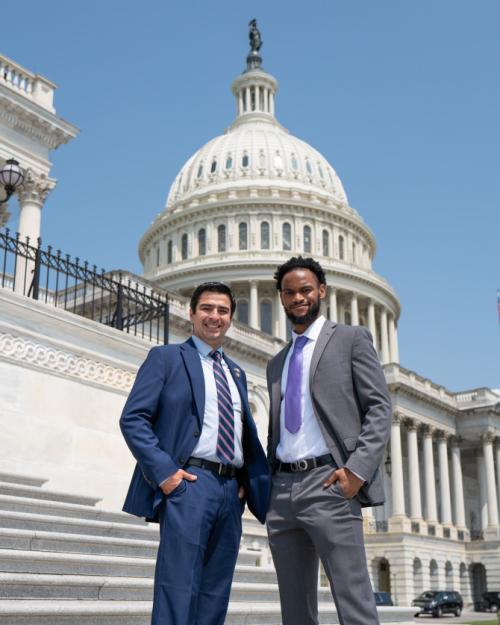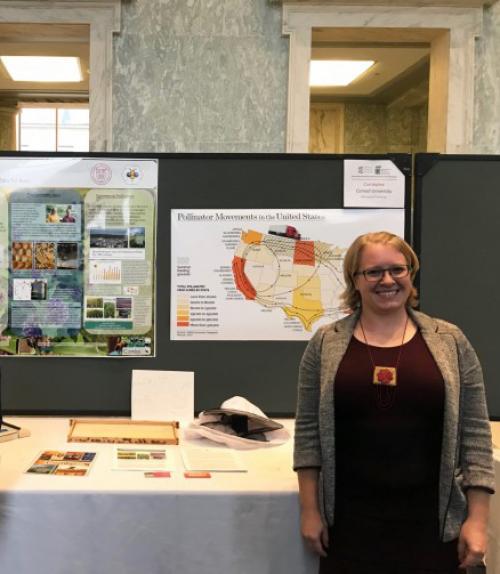The founders of Combplex, a startup run by two Cornell doctoral students, presented their bee colony monitoring technology in Washington, D.C., Nov. 14, highlighting the role of federal funding in the innovation process.
Hailey Scofield, a doctoral student in the field of neurobiology and behavior, and Nathan Oakes, a doctoral student in computational biology, participated in the inaugural Innovation and Entrepreneurship Showcase hosted by the Association of Public and Land Grant Universities (APLU) and the Association of American Universities (AAU). The showcase included an exhibition to APLU, AAU and members of Congress and their staff, and focused on the importance of federal funding to innovation, commercialization and technology transfer at universities.
Scofield and Oakes started Combplex to address declining bee populations by introducing remote monitoring technology. Maintaining the health of bee colonies, who experience an average of 30 percent loss annually, is an essential part of beekeeping, yet the logistical difficulties faced by commercial beekeepers involved in pollination services limit the number of inspections some beekeepers can perform.
Scofield, a National Science Foundation graduate fellow, said: “Normally, beekeepers know how their bees are doing by opening up a colony and physically inspecting the bees, but such inspection is not always possible when beekeepers are responsible for thousands of colonies that are sometimes located 10, 100 or 1,000 miles away. With our product, we hope to make it easier for beekeepers to know which colonies need attention and, ultimately, address issues that threaten the health of a colony.”
Scofield and Oakes joined the Hardware Accelerator, a program run by Rev: Ithaca Startup Works designed to support entrepreneurs launching physical products, after experimenting with prototypes. “We had spent the previous summer putting electronics in bee colonies and having it be a complete disaster – it was all a mess,” said Scofield. “We knew we were going after a data whale that no one had gone after before, but we weren’t sure who would benefit. We thought we were solving a problem for the first time for backyard beekeepers but realized that there is this amazing story about commercial pollinators transporting bees across the country. And what happens to those bees is more of a mystery, a bigger problem.”
The Hardware Acclerator, funded in part by the U.S. Small Business Adminstration and U.S. Economic Development Administration, helped Scofield and Oakes refine their prototype and develop Comblex into a business. “It was helpful to be in an environment where we were coached on speaking to people in business because it is very different from speaking about science. I would never have moved into the business space without that encouragement,” Scofield said. “We also learned that many of the skills we use as researchers translate well into the entrepreneurship and innovation space. For example, developing questions during customer discovery is similar to desigining an experiment.”
Since participating in the Hardware Accelerator, Combplex won pitch competitions at Cornell’s Entrepreneurship Kickoff in September and Entrepreneurship Summit in November. Scofield and Oakes are currently participating in eLab, Cornell’s competitive accelerator for university startups, and plan to work with small-batch manufacturers to launch a field test with commercial beekeepers in New York, including those that transport bees to California almond growers.
At the D.C. event, Scofield and Oakes presented their research to policymakers including Rep. Lamar Smith, R-Texas, chairman of the House Science, Space and Technology Committee, and discussed the role of federal funding in helping startups like Combplex succeed. “We are applying for Small Business Innovation Research funding, which is important because we can’t ask too much of beekepers given the demand for pollinators and the declining bee population,” said Oakes.
“For the first couple rounds of testing we’d like to give beekeepers the technology for free, which is not attractive to venture capitalists,” he said. “Once we have the devices in the colonies, we will have data that other groups will find very profitable and that can be used to solve other intractable problems in agriculture. But we need to get the devices out there, and government funding is what makes our work possible.”
This article orginally appeared in the Cornell Chronicle.




